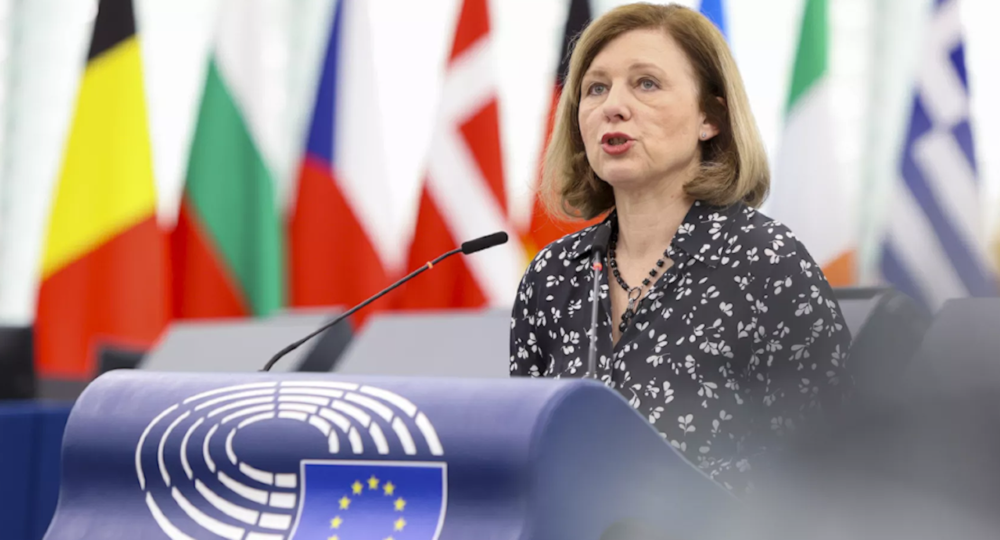EU press freedom, pluralism eroding as media ownership tightens grip
A new report highlights threats to media pluralism across the EU, with governments increasing media control and journalists facing legal pressures, including spyware laws.
-

Former Vice President of Values and Transparency at the European Commission, Věra Jourová, speaks during the European Parliament debate on the Media Freedom Act, March 13, 2024 (European Union)
Media pluralism is increasingly at risk across the EU due to the concentration of media ownership, even in nations long seen as media-friendly, according to a new report by the Civil Liberties Union for Europe, warning of widespread erosion in press freedom.
With input from 43 human rights groups in 21 countries, the report accuses several EU governments of actively undermining press freedom and weakening media independence through poor transparency, growing political influence over public broadcasters, and threats against journalists.
It warns that media pluralism is “under attack across the EU, and in some cases in an existential battle.”
“This isn’t a surprise,” said Jonathan Day, the report’s lead editor. “Governments’ efforts to weaken the rule of law and democratic institutions almost always start by seeking to control their country’s media landscape.”
Day added that the EU’s new safeguard, the European Media Freedom Act (EMFA), is “already facing resistance even before it’s fully in force,” cautioning that its implementation “may be make-or-break for media freedom in some member states.”
The report highlights excessive media ownership concentration in Croatia, France, Hungary, the Netherlands, Slovenia, Spain, and Sweden, often controlled by a few ultra-wealthy individuals, and notes that the problem is worsened by poor transparency, with many states failing to establish the public databases mandated by the EMFA.
Media pluralism threatened across Europe
The report warns that many EU states are either unprepared or unwilling to enforce EMFA, which seeks to protect journalistic sources, ensure regulatory independence, and enforce ownership transparency.
EMFA was approved in March of 2024. At the time, the President of the European Chamber, Roberta Metsola, said the chamber had "made history" by passing the Act, which is the first-ever EU rule to protect the free press.
At the time, several EU countries, notably France, Italy, Malta, Greece, Cyprus, Sweden, and Finland, pushed for an exemption to allow governments to intercept journalist-source communications in cases of national security. However, Sabine Verheyen (Germany, EPP), the lead legislator, had stated that under the final legislation, spyware can only be used as a "last resort" with legal justification. At the time, she emphasized that journalists must be notified and that there would be "no restrictions on the investigative work carried out by journalists."
Today, @Europarl_EN made history.
— Roberta Metsola (@EP_President) March 13, 2024
The Media Freedom Act will safeguard journalists from interference, protects them from revealing sources & ensures transparency of media ownership.
It fights disinformation.
For Daphne. For Ján. For all journalists threatened.
For democracy. pic.twitter.com/VgEhnafVe8
France was flagged for “significant media pluralism challenges” following Vincent Bolloré’s takeover of the Hachette group. In Italy, concerns focus on the Angelucci Group’s planned purchase of AGI, a major news agency, by far-right MP Antonio Angelucci.
In Sweden, Bonnier controls 43% of subscription-based newspapers, while Schibsted owns key outlets like Aftonbladet. In the Netherlands, RTL Nederland and Talpa dominate 75% of TV media, and DPG Media is pursuing a major online merger.
DPG’s dominance increased in 2023 when it announced plans to acquire Mediahuis, a competitor. This acquisition is currently under investigation by the Dutch consumer and markets authority due to concerns about further reducing media pluralism.
Germany is seeing widespread newsroom cuts, while Hungary remains the most extreme case, with the Central European Press and Media Foundation (Kesma), backed by Prime Minister Viktor Orban, operates as “a centralized, pro-government media conglomerate,” according to the report.
Rising political pressure, journalist harassment
Governments are exerting media control by channeling state ads to loyal outlets, particularly in Bulgaria, Croatia, Greece, Malta, Slovenia, and Spain. Hungary’s public media is described as a “fully captured government mouthpiece,” with similar trends in Slovakia, Croatia, Greece, Bulgaria, and Italy.
Journalists continue to face threats and violence, including police assaults in France, Germany, Greece, Hungary, and Spain in 2024. Women journalists were disproportionately targeted, and abusive SLAPP lawsuits are a growing threat in at least a dozen EU countries. In one case, Slovakia’s Prime Minister Robert Fico personally initiated legal action against a journalist.
Public officials also obstructed access to information by denying or ignoring freedom of information requests in Bulgaria, Germany, Greece, Malta, the Netherlands, and Spain, further undermining press freedom.

 4 Min Read
4 Min Read








